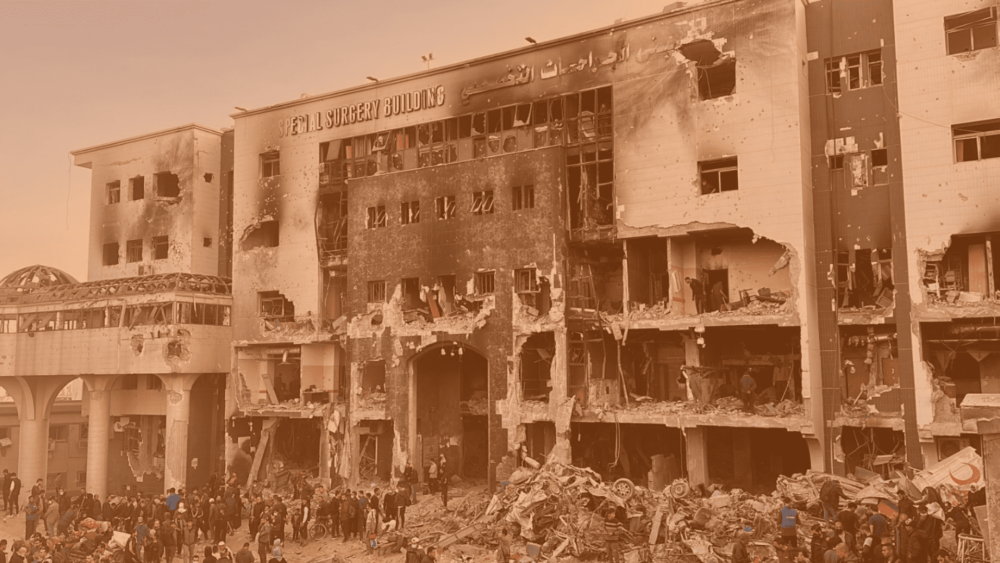Through its latest vicious set of attacks against healthcare in Gaza, Israel leaves no doubts that it is set to destroy all remaining health infrastructure in the Strip
The World Health Organization (WHO) stated that by destroying Al-Shifa Hospital in Gaza, Israeli armed forces ripped the heart out of Gaza’s healthcare system. On April 1, Israeli soldiers left the Strip’s once-largest hospital complex after a two-week siege, during which they terrorized patients and health workers, destroyed equipment, and killed hundreds of people.
Al-Shifa was built with the intention of being a “house of healing”, yet it has turned into a “house of death” following the attacks of the Israeli Occupying Forces (IOF), said Mads Gilbert, a physician and solidarity worker, in a post on X. What was done to Al-Shifa stands as “a massive symbol of the heartless, cynical Israeli politics of colonial occupation with the goal of eliminating the Palestinian people, their social institutions, and their lives,” he stated.
Among those killed in Al-Shifa over the past weeks, whose bodies were discovered after the departure of the IOF, were even more health workers. One of them, plastic surgeon Ahmad Maqadmeh, worked in an area of healthcare crucial for the types of trauma injuries Palestinians suffer from following Israeli attacks. Maqadmeh and his mother were executed as they tried to leave Al-Shifa, surgeon Ghassan Abu-Sitta said in an interview with Democracy Now!.
The targeting of health workers has been a cruel leitmotif of the most recent Israeli war on Gaza. Close to 400 health workers have been killed, and hundreds more detained or arrested since October 7. The IOF’s practice of selecting health workers among besieged groups and exposing them to humiliation and torture is well known to both staff and patients.
Reports from international health workers who recently returned from medical missions in Gaza describe health workers “changing out of their scrubs or being told by civilians to change out of their scrubs when they’re fleeing,” said pediatrician Tanya Haj-Hassan. “We’ve had civilians give healthcare workers their own clothes so that they’re not seen wearing scrubs because we know that healthcare workers have been systematically targeted in this particular war.”
In parallel to the physical violence to which the IOF subjected people at Al-Shifa, health workers, and patients alike, the siege also worsened the nutrition and sanitation status for thousands of people. At one point, health workers were forced to move admitted patients to a room without access to food and a toilet. The patients were forced to share a single bottle of water among 15 of them, according to the WHO.
The effects of the chronic lack of food caused by Israeli blockades on humanitarian missions are growing by the day. The fear of famine setting into Gaza is no longer just a concern but something that has already begun, according to recent statements by UNICEF officials.
Babies born with an uncertain future
Children continue to die from malnutrition, especially in the northern areas. The WHO warned that the few hospitals still able to continue with partial provision of healthcare are reporting increasing numbers of babies born with very low birth weight, with many of them dying as a result. The children’s nutrition status is closely interlinked with that of their mothers, who had very high rates of anemia even before the beginning of the latest attacks, as well as to the lack of infant formula.
Amber Alayyan, a pediatrician and Palestine program manager with Doctors Without Borders (MSF), previously explained the interlinkage between young children’s malnutrition, mothers’ nutrition status, and the Israeli aid blockades. “Those children need to be breastfed. If they can’t be breastfed, they need formula. To have formula, you need clean water. None of these things are possible.”
Right now, families are resorting to feeding infants with the only alternatives available to them, including squeezing dates into handkerchiefs. Not only does this carry short-term risks of children dying of hunger directly, but it will certainly undermine the health status of children in the long-term. They will be more at risk of developing diabetes and high blood pressure, but also emotional and psychological consequences, Dr. Alayyan said at the time.
A war on children
As has been well documented since the beginning of October, the latest Israeli war on Gaza has clearly been a war on children. In addition to dying from hunger, children across the Gaza Strip have also been disproportionately suffering from physical trauma. According to estimates provided by Dr. Abu-Sittah, between 4,000 and 5,000 more children are now living with disabilities caused by Israeli attacks. “This is a lifelong trajectory of surgery and of disability and of mental health scarring as a result of the deformity,” Abu-Sittah warned.
“I remember one incident where we received a young boy whose face had been partially blown off, and we were providing care for him while providing care for his sister in the adjacent bed. His sister had 96% of her body burned. Their parents and all of their other siblings had been killed in the same attack,” Tanya Haj-Hassan said to Democracy Now!.
Even if a ceasefire was implemented today, the impact of Israeli attacks on children’s health would be unprecedented. Considering that any chance of stopping the attacks continues to be blocked by Israeli authorities, the extent of these consequences is certain to grow even further.
This article was written by Ana Vračar for Peoples Dispatch and has been republished under a Creative Commons license
Do you want to be informed of DiEM25's actions? Sign up here















